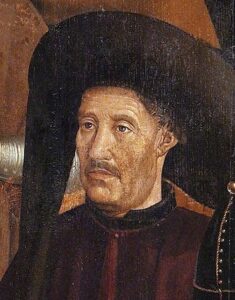
Henrique of Portugal
*Henrique of Portugal, Duke of Viseu, was born on this date in 1394. Known as Prince Henry the Navigator, he was a white Portuguese slave trader and a central figure in the early days of the Portuguese Empire.
Henry was the third surviving son of King John I and his wife Philippa, sister of King Henry IV of England. He was born and baptized in Porto. Henry was 21 when he, his father, and his brothers captured the Moorish port of Ceuta in northern Morocco. Ceuta had long been a base for Barbary pirates who raided the Portuguese coast, depopulating villages by capturing their inhabitants to be sold in the African slave trade. Following this success, Henry began to explore the coast of Africa, most of which was unknown to Europeans.
His objectives included finding the source of the West African gold trade and the legendary Christian kingdom of Prester John and stopping the pirate attacks on the Portuguese coast. At that time, the cargo ships of the Mediterranean needed to be faster and lighter to undertake such voyages. Under Henry's direction, a new and much lighter ship was developed, the caravel, which could sail farther and faster. With this ship, Portuguese mariners freely explored uncharted waters around the Atlantic, from rivers and shallow waters to transoceanic voyages.
Resources and income
On May 25, 1420, he gained an appointment as the Grand Master of the Military Order of Christ for the remainder of his life. The Order was a source of funds for Henry's ambitious plans, especially his persistent attempts to conquer the Canary Islands, which the Portuguese claimed to have discovered before 1346. In 1431, Henry donated houses for the Estudo Geral to teach all the sciences—grammar, logic, rhetoric, arithmetic, music, and astronomy—in what would later become the University of Lisbon. He ordered each room to be decorated according to the subject taught for other subjects like medicine or philosophy.
In 1433, Henry's eldest brother, Edward of Portugal, became king. He granted Henry all profits from trading within the areas he discovered and the sole right to authorize expeditions beyond Cape Bojador. Henry also held a monopoly on tuna fishing in the Algarve. Henry functioned as a primary organizer of the disastrous expedition to Tangier in 1437 against Çala Ben Çala, which ended in Henry's younger brother Ferdinand being given as hostage to guarantee Portuguese promises in the peace agreement. Using the caravel, the expeditions then pushed onwards. Nuno Tristão and Antão Gonçalves reached Cape Blanco in 1441. The Portuguese sighted the Bay of Arguin in 1443 and built a critical "forte-Vitoria" around 1448.
By this stage, the explorers had passed the southern boundary of the desert, and from then on, Henry had one of his wishes fulfilled: the Portuguese had circumvented the Muslim land-based trade routes across the western Sahara Desert, and slaves and gold began arriving in Portugal. This rerouting of trade devastated Algiers and Tunis but made Portugal rich. By 1452, the influx of gold permitted the minting of Portugal's first gold cruzado coins. A cruzado was equal to 400 reis at the time. From 1444 to 1446, as many as forty vessels sailed from Lagos on Henry's behalf, and the first private mercantile expeditions began.
Alvise Cadamosto explored the Atlantic coast of Africa and discovered several islands of the Cape Verde archipelago between 1453 and 1456. In his first voyage, which started in March 1455, he visited the Madeira and Canary Islands. On the second voyage in 1456, Cadamosto became the first European to reach the Cape Verde Islands. Through his administrative direction, he was the main initiator of what would be known as the Age of Discovery. Henrique of Portugal, Duke of Viseu, died on November 13, 1460.